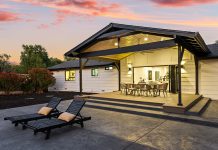Jennifer’s family comes from the tiny village of Palo Alto in the state of Michoacan, Mexico. Her dad, José, immigrated undocumented to California first in 1989 and then again in 1994. In 1994, he remained in Healdsburg, gaining success through his hard work as a full-time vineyard supervisor. Though two of his brothers became residents through the 1986 amnesty, this was before José’s arrival. It took him 18 years to become a California resident.
A middle child, Jennifer was born in 1997 and still lives in the tiny house in Healdsburg that her parents have resided in since they first arrived. She recalls that growing up there were three related families of five each (15 people total) living in the three-bedroom house, one family per room. In junior high, while part of Sonoma County’s Migrant Education program, she learned that her parents were undocumented and began to grasp just what that meant.
“You can’t go to the Migrant Ed summer program again because it requires us to travel back and forth to Mexico,” Jennifer’s mother explained. “We don’t have the documents.”
“At that point,” Jennifer says, “I became scared that at any moment someone could come for my parents, and I didn’t understand how they got here until Dad told me their story. At that point, I saw how much my parents had sacrificed for me and how dangerous their journey had been.
“All my hard work since then has been for my dad, who I’m so proud of,” Jennifer adds, with tears in her eyes. “Although there was no money for food or clothes in Mexico, I couldn’t understand how they could handle what they had to for me to get to where I am today.”
When Jennifer entered Healdsburg High School, she noticed more media coverage of Mexican deportation and the forced separation of children from their parents.
“I couldn’t help putting myself in the position of those families,” Jennifer says. “’What would I do here without my parents?’ I asked myself. ‘Go to an orphanage? How could I handle the separation? Dad and Mom have waited so long to be residents, but I don’t want to stay here alone!’
“In fourth grade, I recall one friend mentioning her uncle paid for her to come here,” Jennifer continues. “Another friend said her dad had brought them. But in school, we kids never talked about residency issues with our friends because so many of us were too scared.”
When Jennifer was in eighth grade, her beloved grandmother, a part-time Healdsburg resident, died. Jennifer’s father wanted to bury his mother in Mexico in the family cemetery. Jennifer felt helpless upon seeing his pain of not being able to travel to Mexico for the burial (because he couldn’t reenter the U.S.).
Feeling an increasing sense of injustice, Jennifer joined the Mayan Club upon entering Healdsburg High School. Here she found others like her – afraid to speak up – and they joined together. With the help of advisors Toni Saunders and Auria Correa (both now retired), Jennifer felt encouraged and empowered. By her junior year, she was on the Mayan Club board as the historian and publicist. As a senior this past school year, she became board co-president and an accomplished public speaker.
Jennifer also discovered she loved working with children. She volunteered with Healdsburg’s After School Program for her community service and she did her junior year internship at Alexander Valley School, where she enjoyed working with a different grade level each week. Here she fell in love with second graders and decided to become a teacher.
As a HHS graduating senior last week, Jennifer received seven scholarships for college at Sonoma State University – The Carol Ann Warner Adams Scholarship, a scholarship for being in the Immersion Program for six years, the HATA scholarship for fifth year students going into teaching, 10,000 Degrees (a very successful educational scholarship program), a SSU multi-cultural educator’s program scholarship and two financial grants from SSU. She was also chosen to give a speech in Spanish at her graduation in which she envisioned success for herself and her fellow students.
Jennifer credits her parents most of all, but also HHS counseling intern Sandra Aguada and (former) Mayan Club mentors Auria Correa and Toni Saunders for the emotional support they gave. Her own vision is to do something she’s passionate about in life and to help the community by giving back that which was given to her.
When I interviewed José Silva for a book project of mine, I inquired about his challenging struggle to get to and remain in the U.S. “Was it all worth it?” I asked.
“I miss Mexico because it is my homeland, but I have no regrets,” José told me. “I still have two brothers and a sister in Palo Alto and I am excited about now being able to see them and then return here without worry. But if we were in Mexico, I could never have afforded to send my daughter to college. I think the outcome of our lives proves that I made the right choice.”
Shonnie Brown is a local author and memoirist who is interested in fostering connections between people and their community. Shonnie writes personal and family histories through her business, Sonoma LifeStories, and is also a licensed Marriage and Family Therapist. She can be reached by e-mail at sh*****@***ic.net or on the web at www.sono
malifestories.com.








